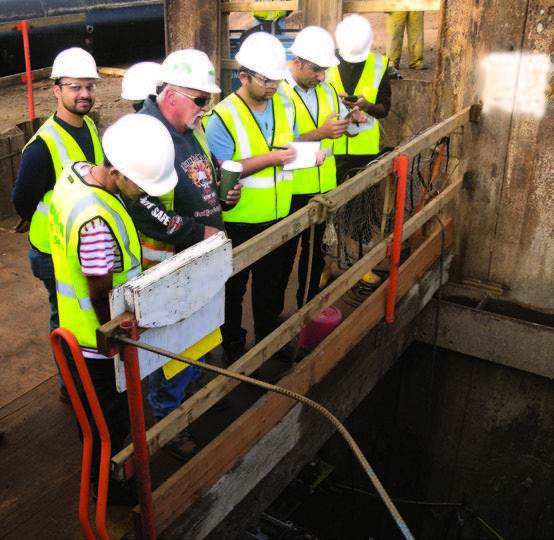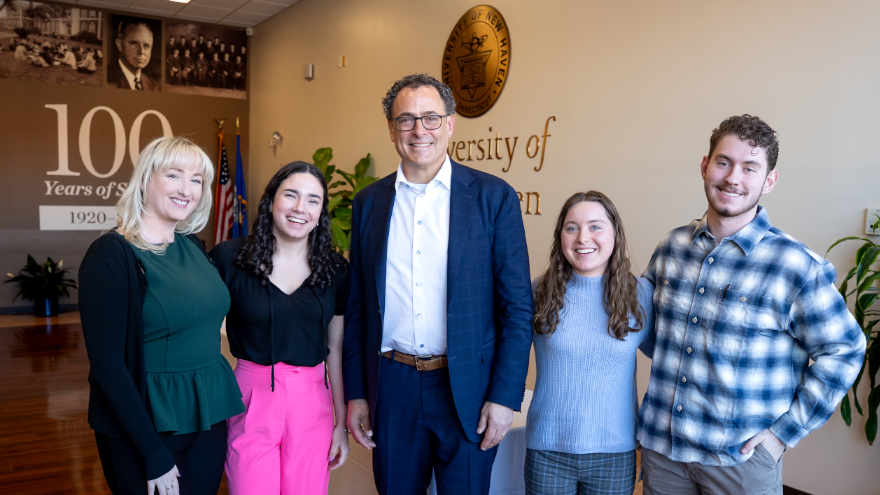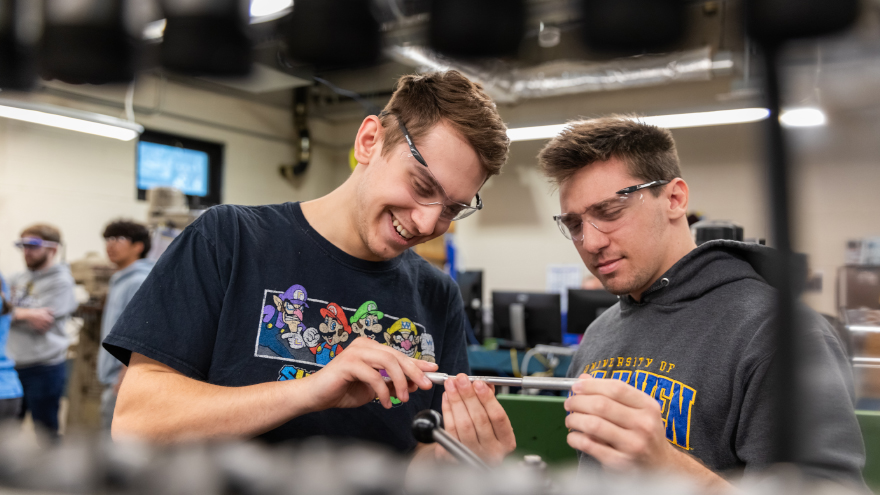The new master’s degree in civil engineering, which features a blend of theory and hands-on application, enables students to focus on such areas as sustainability, environmental engineering, and construction management.
April 26, 2018
By Jackie Hennessey, contributing writer
One of the first texts Clifford J. Schexnayder had students read in his Introduction to Construction Management course was Walden by Henry David Thoreau.
As the first students in the Tagliatela College of Engineering's new graduate program in Civil Engineering, they were very quickly out in the field with Schexnayder, working in teams.
"To be a good engineer you must take time to observe the environment of your project, the physical environment and the social/community environment." Clifford J. Schexnayder
Early in the course, Dr. Schexnayder took his students to the Walsh Construction Co. pump station project in Middletown. He wanted to get them out in the mud and give them an opportunity to talk with the engineers on a real project.

"I required a report on the site visit, and then in class we talked about what was observed. They all wrote about what the project was about, but most failed on this first visit to the field to carefully note machine and labor production. How long did it take to push a micro pile into the ground? Back in the classroom, we discussed things we should be observing."
Before they charge into the mechanical tasks of their work, Schexnayder said, he wants students to look around a while at the project site and think about the impact their work will have on the environment and how that environment will affect their work, the selected materials, and overall costs. "You are working in England," he asks them. "How does the weather affect your production?"
Schexnayder is part of the multidisciplinary team of professors teaching in the new Civil Engineering graduate program launched in the fall of 2017. The program features courses in civil engineering, including construction management, sustainability, structural engineering, and environmental engineering.
Dr. Byungik Chang, Program Coordinator and Associate Professor of Civil Engineering, said the new master’s program is a blend of theory and hands-on applications. Students in the master’s program spend time in classes and out in the field and will have the chance to do collaborative research with professors across engineering disciplines and program areas.
Graduate students have the option to take courses in four focus areas: Sustainability, Environmental Engineering, Structural Engineering, or Construction Management. Chang said graduates can go on to work for Departments of Transportation, the Federal Highway Administration, the EPA, or they can pursue work in general civil engineering, urban planning, or consulting firms. "We are very excited to have our first students in the program," Chang said.
Chang said Schexnayder brings decades of experience teaching and working in construction engineering. Dr. Schexnayder is an Eminent Scholar Emeritus, at the School of Construction at Arizona State University, has been a Fulbright Lecturer/Research Scholar at the Universidad de Piura, Piura, Peru, and a Dibner Library Resident Scholar at the Smithsonian Institute Libraries in Washington, D.C. He taught engineering at the U.S. Army Engineer School, Fort Leonard Wood, Missouri and is co-author of the textbooks Construction Management Fundamentals and Construction Equipment and Methods.
"For those students in other specialties, this will be their only construction course, but it will serve them well," he said. "Engineering and construction have lots of specialties, but we all need to know something about how the other players on the team work."
"With a median starting salary of $83,500 and with the U.S. Department of Labor’s Bureau of Labor Statistics projecting 11 percent growth in civil engineering jobs over the next 10 years, civil engineering is a field rich with opportunities." Dr. Byungik Chang, Program Coordinator and Associate Professor of Civil Engineering
The Labor Bureau reports that "as infrastructure continues to age, civil engineers will be needed to manage projects to rebuild, repair, maintain, and upgrade bridges, roads, levees, dams, airports, buildings, and structures of all types." Chang said research also shows that the demand for master’s degree programs across the country has grown by eight percent, "and the need for a graduate program in this region is strong."
"Civil Engineering never dies. It will move forward until the end of the earth’s life because we need to develop the earth and maintain the earth." - Dr. Byungik Chang



